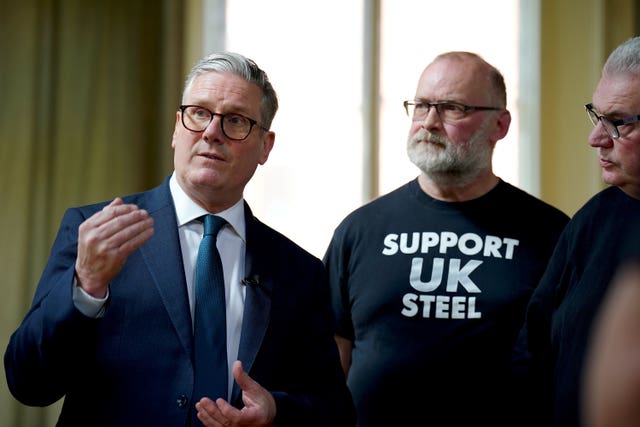More than a dozen businesses offer to help British Steel keep furnaces burning
If the blast furnaces at the Scunthorpe steelworks run out of raw materials, they can never be turned back on.

More than a dozen firms are understood to have offered to help British Steel secure raw materials for its Scunthorpe works since the Government took control of the business.
Ministers took over the Scunthorpe steelworks under emergency legislation passed on Saturday in an effort to stop Britain’s last primary steelmaking facility from closing irrevocably.
British Steel now faces a race against time to secure enough raw materials to keep its two blast furnaces going, and is looking at emergency measures including working with other businesses in the sector.
If the blast furnaces run out of raw materials, they can never be turned back on.
Preventing that from happening was the primary reason for the Government recalling Parliament on Saturday to pass emergency legislation to keep the site open.

But on Sunday morning, Business Secretary Jonathan Reynolds was unable to guarantee that the company would be able to secure enough coke and iron ore to keep the furnaces burning.
He told the BBC: “If we hadn’t acted, the blast furnaces were gone, steel production in the UK, primary steel producing, would have gone.
“So we’ve given ourselves the opportunity, we are in control of the site, my officials are on site right now to give us a chance to do that.”
The offers of additional support also mean that British Steel is reassessing its options.
This includes possibly reversing a decision by its Chinese owners, Jingye, to take one of the blast furnaces temporarily offline this week using a “salamander tap”, a procedure said to be dangerous.

On Sunday, Mr Reynolds said the Government had decided to take emergency action when it learned that Jingye had not only stopped ordering more raw materials, but begun selling off the supplies it already had.
The company had also rejected an offer of support in the region of £500 million, instead demanding more than twice that figure with few guarantees the blast furnaces would stay open.
In the Commons on Saturday, Mr Reynolds said Jingye had not been negotiating “in good faith”, while on Sunday he said it had not been acting “rationally”.
He suggested the company’s ultimate plan had been to close the blast furnaces, but keep hold of the more profitable steel mills and supply them by importing steel from China.
But he declined to accuse the company of deliberately sabotaging the business at the behest of the Chinese Communist Party (CCP).
Having taken control of British Steel, ministers remain hopeful they can find a private company to invest in the business given the cost of modernising the Scunthorpe plant could run into the billions.
But there are currently no private investors willing to take the company on, and Mr Reynolds has acknowledged nationalisation remains “the likely option”.
He added that the Government expects to lose money running British Steel, but the cost of not acting would have been higher.
Meanwhile, the Conservatives have criticised the Government’s response as a “botched nationalisation” that revealed “the Government have no plan”.
Shadow business secretary Andrew Griffith said: “The Government said their preference is to find a commercial partner, but do they think that is likely, after Labour have attacked business with a £25 billion jobs tax and are bringing forward a Bill to create the most hostile environment for employers since the 1970s.
“Conservatives like Martin Vickers MP and Teesside Mayor Ben Houchen have been warning about the issues at Scunthorpe, but they were ignored by the Labour Government. Now the Business Secretary says there is only a ‘chance’ to keep the furnaces burning, showing they have acted too late.
“The Labour Government have landed themselves in a steel crisis entirely of their own making. They’ve made poor decisions and let the unions dictate their actions.”





